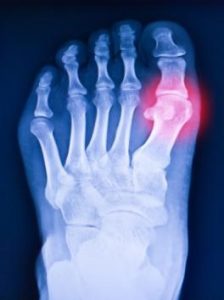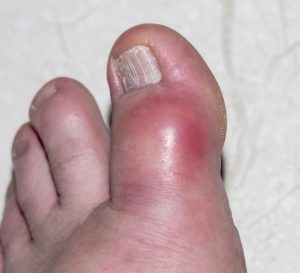Introduction:
Gout, a form of inflammatory arthritis, has been afflicting individuals for centuries, with its hallmark symptoms of sudden, severe joint pain and inflammation. In this blog post, we will explore the unique challenges of gout, the crucial role podiatrists play in its management, and the efficacy of oral medications in alleviating the discomfort associated with this condition.
Section 1: Understanding Gout
**The Culprit: Uric Acid Crystals: **
Gout is characterized by the accumulation of uric acid crystals in the joints, often targeting the big toe. These crystals cause sudden and intense pain, redness, and swelling.

**Risk Factors: **
Various factors contribute to the development of gout, including genetics, diet high in purines (found in certain foods), obesity, and certain medical conditions. Men are more commonly affected, and the risk increases with age.
Section 2: The Podiatrist’s Integral Role
**Accurate Diagnosis: **
Podiatrists are skilled in diagnosing gout based on a combination of symptoms, medical history, and, if necessary, laboratory tests to measure uric acid levels in the blood or joint fluid.

**Treatment Planning: **
A podiatrist collaborates with patients to develop a personalized treatment plan, addressing acute attacks and long-term management strategies. Lifestyle modifications, dietary recommendations, and medication management are key components.
**Pain Relief and Inflammation Control: **
Podiatrists utilize various methods to alleviate pain and control inflammation during acute gout attacks. This may involve the prescription of nonsteroidal anti-inflammatory drugs (NSAIDs) or corticosteroids.
Section 3: Oral Medications for Gout Management

**Colchicine: **
Colchicine is an oral medication commonly prescribed for gout. It works by reducing inflammation and inhibiting the movement of white blood cells to the affected area. Podiatrists may recommend colchicine during acute attacks or for preventive measures.
**Nonsteroidal Anti-Inflammatory Drugs (NSAIDs): **
NSAIDs such as ibuprofen and naproxen are often prescribed to relieve pain and inflammation associated with gout. These medications can be effective for short-term relief but may have gastrointestinal side effects.
**Xanthine Oxidase Inhibitors: **
Medications like allopurinol and febuxostat target the root cause of gout by reducing the production of uric acid. Podiatrists may recommend these medications for long-term management to prevent recurring attacks.
**Uricosuric Agents: **
Uricosuric medications, like probenecid, enhance the excretion of uric acid by the kidneys. These drugs are another option for patients who may not tolerate or respond well to other medications.
Section 4: Lifestyle Modifications for Gout Management
**Dietary Changes: **
Podiatrists often advise patients to make dietary changes, including reducing the intake of purine-rich foods and increasing hydration, to help manage gout symptoms.
**Weight Management: **
Maintaining a healthy weight is crucial for individuals with gout, as excess weight can contribute to higher uric acid levels and increased risk of flare-ups.
**Promoting Joint Mobility**
One of the potential changes that occur for numerous gout attacks is arthritis. As podiatrist, we can help mobilise the joints to prevent degenerative arthritis and offload or support the joint with custom orthotics.
Conclusion:
Gout is a complex condition that requires a comprehensive approach to management. Podiatrists play a pivotal role in diagnosing gout, providing immediate relief during acute attacks, and developing long-term strategies for prevention.
Oral medications, when used judiciously, can significantly contribute to the effective management of gout, offering relief and improved quality of life for those affected by this painful condition. If you suspect you may have gout or are experiencing symptoms, consulting with a podiatrist is a crucial step toward finding relief and long-term management solutions.
Here at Leading Edge Podiatry, our goal is to help our patient live healthy and active lives.
We can help settle those acute gout attacks and promote mobility in the feet. Call us on 7120 6063 or book online.

